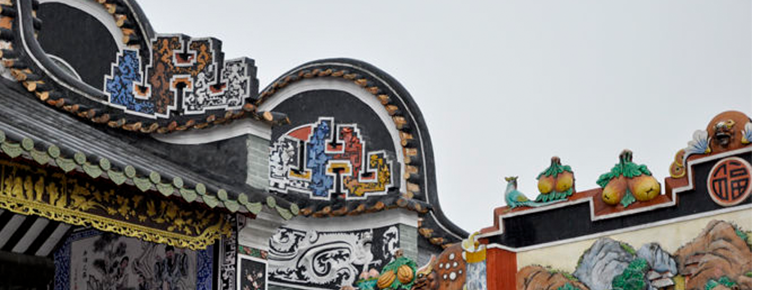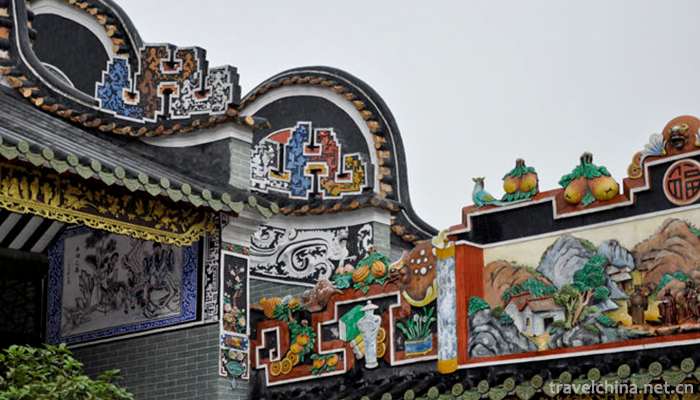2019-02-06

- By ChinaWiki.net
- Chinese Edition
- 2019-05-04
Grey plastic
Gray plastic gray plastic, known as gray batch in ancient times, is the traditional architectural decoration technology in Lingnan area. The material is mainly lime. The works are attached to the edges of the building walls and roofs or other architectural techniques. They originated very early. They were most popular in the Ming and Qing dynasties, especially in ancestral halls, temples and grand houses.
On June 7, 2008, the gray sculpture was approved by the State Council to be included in the second batch of national intangible cultural heritage list.
Brief description of grey plastic
Gray plastic process is fine, three-dimensional, rich in color; wide range of subjects, easy to understand, mostly favorite people, flowers and birds, insects and fish, Swiss animals, landscapes and calligraphy.
Guangzhou gray sculpture has remarkable regional characteristics and traditional folk art value. In terms of workmanship, Guangzhou gray sculpture is exquisite and colorful. In terms of materials, lime sculpture artists adapt to local conditions and adopt lime sculpture materials suitable for the hot and humid climate in Guangzhou. It is acid-resistant, alkali-resistant and temperature-resistant. In terms of production process, Guangzhou gray sculpture must be made at the scene of the building to be sculpted at room temperature without firing. In the process of making, decorative ventilation holes are cleverly left in the scenery or between each group of patterns, thus reducing the violent impact of Typhoon on ridge decoration. Most notably, it will take about 10 years for the gray plastic art to become a master and build independently.
Grey plastic inheritance
Crafts were introduced to Huaxian (today's Huadu) from the late Qing Dynasty to the early Republic of China. In Tieshan Village, Huashan Town, early Minxuan, some people engaged in gray-plastic crafts. In the 1920s and 1930s, there were many people in Guangzhou's gray plastic industry who were from Huaxian (now Huadu District). Shao Bo, a grey sculpture artist in Tieshan village of Huashan, learned from the old artists in the village when he was a teenager, and later became a famous grey sculpture artist with superb skills. His son Shao Chengcun, 15 years old, studied art with his father and was taught by his father. Now, he has been active in the construction and craftsmanship circle of the Pearl River Delta for more than 20 years. His gray sculpture works were left when dozens of buildings such as Chen's Academy, Six Rong Temple, Guangxiao Temple and Sanyuanli Ancient Temple were renovated in Guangzhou.
The artists who are engaged in the gray-plastic craft are rare in Huadu and even in the Pearl River Delta. This folk craft needs to be cherished and protected urgently so that the traditional gray-plastic craft can be used in the construction industry.
Grey plastic process
Raw material
Quick lime, paper reinforcement, straw, mineral pigments, steel nails, steel wire.
Material preparation and processing
Paper reinforcement lime: 1:5 ratio of lime and water, after penetration and dilution, filtered with sieve, shaped into plaster, added 20% paper reinforcement, 5/1000 of yellow sugar (brown sugar) stirring once, stirring for the second time after 70% drying, and then after 10 days can be used. The pigments were diluted with lime water and soaked for 15 days.
Conceiving Gray Molding
Conceiving gray moulding is the most difficult and the most important process of gray moulding. According to the position, area and pattern of gray moulding, carefully measure and conceive, and then determine the moulding. The selected theme ideas are allocated to the position of mind one by one.
Fixed lime-plastic skeleton
The shape and size of the gray-plastic skeleton needed to be bundled with steel nails and copper wires must be fixed in the position of the gray-plastic, and the skeleton must be smaller than the volume of the gray-plastic made.
Modeling bottoming
Grass-root ash should not be more than 5 centimeters thick for the first time when it is used around the skeleton. Additional gray-root ash should be added every other day. Each layer of grass-root ash must be compacted until it is shaped with grass-root ash. But we should pay attention to whether the gray shape and the up-looking vision can reach the ideal.
Ash disposal
The paper reinforcement ash is used to make the surface of grass-roots ash smooth, delicate and vivid (when using paper reinforcement ash, you can add the required pigments, mix and batch again). So far, the whole gray relief process has been completed.
Top color
Painting from paper gluten to grey must be completed at the same time on the same day. Because the gray plastic has a certain humidity, the pigments can penetrate into the gray plastic. The gray plastic and the pigments are oxidized synchronously, so that the color of the gray plastic is bright, and it can be maintained for a long time without fading.

Ask a Question
Your email address will not be published.



0 Questions